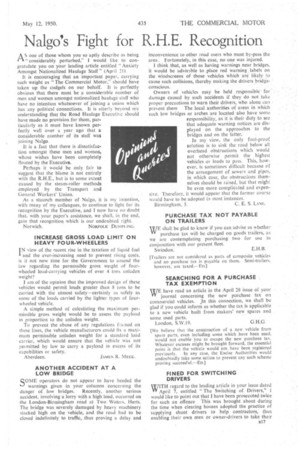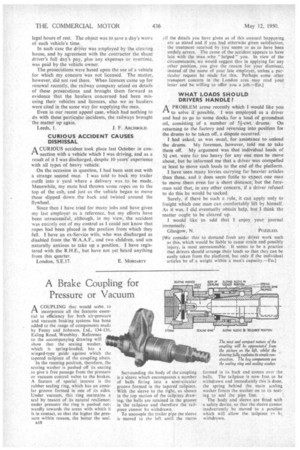Nalgo's Fight for R.H.E. Recognition
Page 51

Page 52

If you've noticed an error in this article please click here to report it so we can fix it.
A S one of those whom you so aptly describe as being " considerably perturbed," I would like to congratulate you on your leading article entitled "Anxiety Amongst Nationalized Haulage Staff" (April 21).
It is encouraging that an important paper, carrying such weight as The Commercial Motor," should have taken up the cudgels on our behalf. It is perfectly obvious that there must be a considerable number of Men and women amongst nationalized haulage staff who have no intention whatsoever of joining a union which has any political connections. It is utterly beyond My understanding that the Road Haulage Executive should have made no provision for them, particularly as it must have known perfectly well over a year ago that a considerable number of its staff was joining Nalgo.
It is a fact that there is dissatisfaction amongst these men and women, whose wishes have been completely flouted by the Executive.
Perhaps it would be only fair to suggest that the blame is not entirely with the R.H.E., but is to some extent caused by the steam-roller methods employed by the Transport and General Workers' Union.
As a staunch member of Nalgo, it is my intention, with many of my colleagues, to continue to fight for its recognition by the Executive, and I now have no doubt that, with your paper's assistance, we shall, in the end, gain that recognition which is our undoubted right.
Norwich. NORFOLK DUMPLING.
INCREASE GROSS LOAD LIMIT ON HEAVY FOUR-WHEELERS
IN view of the recent rise in the taxation of liquid fuel I and the ever-increasing need to prevent rising costs, is it not now time for the Government to amend the law regarding the permissible gross weight of fourwheeled load-carrying vehicles of over 4 tons unladen weight?
I am of the opinion that the improved design of these vehicles would permit loads, greater than 8 tons to be carried with the utmost safety—certainly as safely as some of the loads carried by the lighter types of fourwheeled vehicle.
A simple method of calculating the maximum permissible gross weight would be to assess the payload in proportion to the unladen weight.
To prevent the abuse of any regulations framed on these lines, the vehicle manufacturers could fix a maximum permissible unlade.n weight for a standard load carrier, which would ensure that the vehicle was not permitted by law to carry a payload in excess of its capabilities or safety. .
Aberdeen. JAMES R. MEEK.
ANOTHER ACCIDENT AT A LOW BRIDGE
SOME operators do not appear to have heeded the
• -) warnings given in your columns concerning the danger of low bridges. Recently, another serious accident, involving a lorry with a high load, occurred on the London-Birmingham road at Two Waters, Herts. The bridge was severely damaged by heavy machinery stacked high on the vehicle, and the road had to be closed indefinitely to traffic, thus proving a delay and inconvenience to other road users who must by-pass the area.. Vortunately, in this case, no one was injured.
I think, that, as Well as having warnings near bridges, it would be advisable to .place red' Warning ,labels on the windscreens of those vehicles which ar likely ¶o cause such collisions, thereby making the drivers bridge, conscious.
Owners of vehicles may be held responsible' for: damage caused by such accidents if they dci not take proper precautions to warn their drivers, who alone can prevent them The local authorities of areas in whiCh such low bridges or arches are located also have some responsibility, as it is their 'duty to see that adequate warning notices are displayed on the approaches to the bridges and on the latter.'
In my view, the only fool-proof solution is to sink the road below all overhead obstructions which would not otherwise permit the highest vehicles or loads to pass. This, however, is sometimes difficult because of the arrangement of sewers and pipes, in which case, the obstructions themselves should be raised, but that might be even more complicated and expen sive. Therefore, it would appear that the former course would have to be adopted in most instances.
Birmingham, 5, C. E. S. LANE.
PURCHASE TAX NOT PAYABLE ON TRAILERS
WE shall be glad to know if you can advise us whether purchase tax will be charged on goods trailers, as we are contemplating purchasing two for use in conjunction with our present fleet.
Swindon: E.H.B.
[Trailers are not considered as parts of composite vehicles and no purchase tax is payable on them. Semi-trailers, however, are taxed.— En.]
SEARCHING FOR A PURCHASE TAX EXEMPTION
WE have read an article in the April 28 issue of your journal concerning the new purchase tax on
commercial vehicles. this connection, we shall be glad if you could inform us whether the tax is applicable to a new vehicle built from makers' new spares and some used parts. London, S.W.I9. G.H.G.
[We believe that the construction of a new vehicle from spare parts, even including some which have been used, would not enable you to escape the new purchase tax. Whatever excuses might be brought forward. the essential point is that the vehicle would not have been registered previously. In any case, the Excise Authorities would undoubtedly take some action to prevent any such scheme proving successful.—Eol
FINED FOR SWITCHING DRIVERS
WITH regard to the leading article in your issue dated vv April 7, entitled "The Switching of Drivers," I would like to point out that I have been prosecuted twice for such an offence This was brought about during the time when clearing houses adopted the practice of supplying shunt drivers to help contractors, thus enabling their own men or owner-drivers to take their
legal hours of rest. The object was to. save a day's waste of each vehicle's time.
In such case the driver was employed by the clearing house, and by agreement with the contractor the shunt driver's full day's pay, plus any expenses or overtime, was paid by the vehicle owner.
The prosecutions were based upon the use of a vehicle for which my concern was not licensed. The matter, however, did not rest there. When licences came up for renewal recently, the railway company seized on details of these prosecutions and brought them forward as evidence that the hauliers concerned had been misusing their vehicles and licences, also we as hauliers were cited in the same way for supplying the men.
Even in our recent appeal case, which had nothing to do with these particular incidents, the railways brought the matter up again.
Leeds, I. J. F. ARCHBOLD.
CURIOUS ACCIDENT CAUSES DISMISSAL .
ACURIOUS accident took place last October in connection with a vehicle which I was driving, and as a result of it I was discharged. despite 10 years' experience with all types of heavy vehicle.
On the occasion in question, I had been sent out with a strange second man. I was told to back my trailer outfit into a yard where a delivery was to be made. Meanwhile, my mate had thrown some ropes on to the top of the cab, and just as the vehicle began to move these slipped down the back and twisted around the flywheel.
Since then I have tried for many jobs and have given my last employer as a reference, but my efforts have been unsuccessful, although, in my view, the accident was entirely out Of my control as I could not know that ropes had been placed in the position from which they fell. I have an ex-Service wife, who was discharged as disabled from the W.A.A.F., and two children, and am naturally anxious to take up a position. I have registered with the R.I-LE., but have not yet heard anything from this quarter.
London, S.E.I7. E. IVIOR1ARTY i if the details you have given us of this unusual happening are as stated and if you had otherwise given satisfaction, the treatment received by you seems to us to have been unduly severe. The cause of the accident appears to have lain with the man who helped" you. in view of the circumstances, we would suggest that in applying for any other position, you give the reason for your dismissal, instead Of the name of your late employer, unless a particular request be made for this. Perhaps some other transport concern in the London area may read your letter and be willing to offer you a job.—ED.1 WHAT LOADS SHOULD DRIVERS HANDLE?
A PROBLEM arose recently which I would like you " to solve if possible. 1 was employed as a driver and had to go to some docks for a load of groundnut oil, consisting of a number of 5i-cwt. drums. On returning to the factory and reversing into position for the drums to be taken off, a dispute occurred.
I had asked, as was usual, for assistance to unload the drums. My foreman, however, told me to take them off. My argument was that individual loads of 5i cwt. were far too heavy for any one man to move about, but he informed me that a driver was compelled at least to move such loads to the end of the platform. I have seen many lorries carrying far heavier articles than these. and it does seem futile to expect one man to move them even for a short distance, but the fore-man said that, in any other concern, if a driver refused to do this he would be sacked.
Surely, if there be such a rule, it can apply only to freight which one man can comfortably lift by himself. As it was, I did eventually obtain help, but I think the matter ought to be cleared op, .1 would like to add that I enjoy your journal immensely.
Glasgow, N. PUZZLED.
[We consider that to demand from any driver work such as this, which would be liable to cause strain and possibly injury, is most unreasonable. it seems to be a practice that drivers should arrange their loads so that they can be easily taken from the platforrn but only if the individual articles he of a weight within a man's capacity.—En.1




























































































